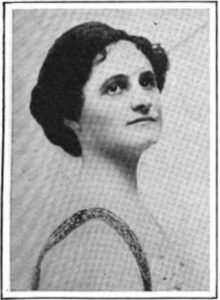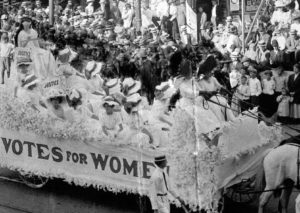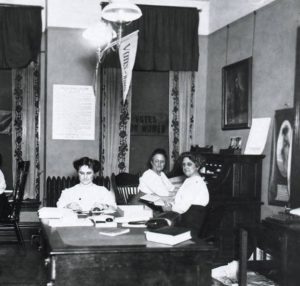About Eva McCall Hamilton (1871–1948)

Eva McCall Hamilton in The Independent, October 23, 1920.
In August of 1920, Eva McCall Hamilton won the Republican primary for a seat in the Michigan State Senate representing the Sixteenth District of Michigan. Just two months later, on election day November 2, 1920, Hamilton won over 18,000 votes to defeat her Democratic opponent Harry White to become the first-ever female state senator in Michigan history.
By the time of her victory, Eva McCall Hamilton had already become a well-known figure in Michigan political circles through her work in the women’s suffrage movement. In 1910, she had helped found the Grand Rapids Equal Franchise Club and held the reins of its horse-drawn float as the new suffrage organization made a splashy debut at the 1910 Grand Rapids Homecoming Parade. But her involvement in the cause took on a new importance in 1911, when she spent two weeks lobbying state politicians in Lansing to vote in favor of a statewide referendum to put the issue of women’s suffrage directly before Michigan voters. Despite her efforts, the proposal failed. Undeterred, Hamilton publicly vowed to canvas the district of every legislator who had come out in favor of the proposal but ultimately voted against it.

Eva McCall Hamilton and Ethelyn Haines at the helm of the Grand Rapids Equal Franchise Club float at the 1910 Grand Rapids Homecoming Parade, Bentley Historical Library.
Hamilton, however, would do far more than canvas districts in the years after the 1911 suffrage referendum defeat. In 1912, she returned to Lansing once more to lobby for the organization of another suffrage referendum. The referendum proposal passed, giving Michigan suffragists just eight months to convince the voters of the state—all men—to approve a state constitutional amendment to grant Michigan women voting rights. Campaign headquarters for the 1912 Michigan suffrage campaign were set up in Grand Rapids. Hamilton herself was appointed publicity chair of the effort and charged with coordinating the production and dissemination of an estimated three tons of suffrage campaign literature.
Although newspapers reported a certain victory in the days after the vote, the 1912 Michigan suffrage referendum ultimately failed by a narrow margin. Michigan suffragists, Hamilton included, lobbied for another referendum in 1913, but it too failed under the pressure of attacks by the Michigan liquor lobby and other anti-suffrage groups. The right to vote for Michigan women in all elections would not come until 1918, after Michigan women demonstrated undeniably their value as citizens through their substantial contributions to the World War I war effort.

State campaign Headquarters for 1912 Suffrage Campaign, Eva McCall Hamilton at center table, Grand Rapids History and Special Collections (GRHSC), Archives, GRPL, GR, Michigan.
Victory in 1918 meant not only that Michigan women could vote but also that they could run for any office they desired—local, state, or national. Hamilton took advantage of this fact in 1920, when she threw her hat in the ring for the Michigan State Senate and won. Her experience heading up publicity for the 1912 Michigan suffrage campaign served her well in the run-up to her victory—as did her lobbying work in Lansing, during which she had earned a reputation as a skilled orator. Moreover, years before her election, Hamilton had already established herself as a leader in municipal affairs, especially as a stalwart advocate for the establishment of Grand Rapids farmers markets.
Although Hamilton lost her bid for reelection in 1922, her election and tenure as a Michigan state senator was historic. No woman before her had ever served in the Michigan legislature. As a state senator, Hamilton was appointed to both the Banks and Corporations, Insurance, and Taxation committees; in addition to chairing the Industrial School and Normal School committees. Hamilton was especially qualified as a committee chair because of her experience as an educator. She herself was a graduate of a normal school (a school for educators) and had spent several years as an educator before entering politics.
Eva McCall Hamilton died of heart failure on January 28, 1948, in Grand Rapids, Michigan. Her election paved the way forward for Michigan women, but it would be almost eighty years before another woman from Kent County would be represented in the Michigan legislature. Joanne Voorhees, from Wyoming, won her seat beginning in 1998. And it would be almost a century before another woman would represent Grand Rapids or Kent County in the Michigan State Senate. That woman—Winnie Brinks—was elected on November 6, 2018, a full 98 years after Hamilton’s historic victory.
About Eva McCall Hamilton (1871–1948)

Eva McCall Hamilton in The Independent, October 23, 1920.
In August of 1920, Eva McCall Hamilton won the Republican primary for a seat in the Michigan State Senate representing the Sixteenth District of Michigan. Just two months later, on election day November 2, 1920, Hamilton won over 18,000 votes to defeat her Democratic opponent Harry White to become the first-ever female state senator in Michigan history.
By the time of her victory, Eva McCall Hamilton had already become a well-known figure in Michigan political circles through her work in the women’s suffrage movement. In 1910, she had helped found the Grand Rapids Equal Franchise Club and held the reins of its horse-drawn float as the new suffrage organization made a splashy debut at the 1910 Grand Rapids Homecoming Parade. But her involvement in the cause took on a new importance in 1911, when she spent two weeks lobbying state politicians in Lansing to vote in favor of a statewide referendum to put the issue of women’s suffrage directly before Michigan voters. Despite her efforts, the proposal failed. Undeterred, Hamilton publicly vowed to canvas the district of every legislator who had come out in favor of the proposal but ultimately voted against it.

Eva McCall Hamilton and Ethelyn Haines at the helm of the Grand Rapids Equal Franchise Club float at the 1910 Grand Rapids Homecoming Parade, Bentley Historical Library.
Hamilton, however, would do far more than canvas districts in the years after the 1911 suffrage referendum defeat. In 1912, she returned to Lansing once more to lobby for the organization of another suffrage referendum. The referendum proposal passed, giving Michigan suffragists just eight months to convince the voters of the state—all men—to approve a state constitutional amendment to grant Michigan women voting rights. Campaign headquarters for the 1912 Michigan suffrage campaign were set up in Grand Rapids. Hamilton herself was appointed publicity chair of the effort and charged with coordinating the production and dissemination of an estimated three tons of suffrage campaign literature.
Although newspapers reported a certain victory in the days after the vote, the 1912 Michigan suffrage referendum ultimately failed by a narrow margin. Michigan suffragists, Hamilton included, lobbied for another referendum in 1913, but it too failed under the pressure of attacks by the Michigan liquor lobby and other anti-suffrage groups. The right to vote for Michigan women in all elections would not come until 1918, after Michigan women demonstrated undeniably their value as citizens through their substantial contributions to the World War I war effort.

State campaign Headquarters for 1912 Suffrage Campaign, Eva McCall Hamilton at center table, Grand Rapids History and Special Collections (GRHSC), Archives, GRPL, GR, Michigan.
Victory in 1918 meant not only that Michigan women could vote but also that they could run for any office they desired—local, state, or national. Hamilton took advantage of this fact in 1920, when she threw her hat in the ring for the Michigan State Senate and won. Her experience heading up publicity for the 1912 Michigan suffrage campaign served her well in the run-up to her victory—as did her lobbying work in Lansing, during which she had earned a reputation as a skilled orator. Moreover, years before her election, Hamilton had already established herself as a leader in municipal affairs, especially as a stalwart advocate for the establishment of Grand Rapids farmers markets.
Although Hamilton lost her bid for reelection in 1922, her election and tenure as a Michigan state senator was historic. No woman before her had ever served in the Michigan legislature. As a state senator, Hamilton was appointed to both the Banks and Corporations, Insurance, and Taxation committees; in addition to chairing the Industrial School and Normal School committees. Hamilton was especially qualified as a committee chair because of her experience as an educator. She herself was a graduate of a normal school (a school for educators) and had spent several years as an educator before entering politics.
Eva McCall Hamilton died of heart failure on January 28, 1948, in Grand Rapids, Michigan. Her election paved the way forward for Michigan women, but it would be almost eighty years before another woman from Kent County would be represented in the Michigan legislature. Joanne Voorhees, from Wyoming, won her seat beginning in 1998. And it would be almost a century before another woman would represent Grand Rapids or Kent County in the Michigan State Senate. That woman—Winnie Brinks—was elected on November 6, 2018, a full 98 years after Hamilton’s historic victory.
Campaign Information
FIRST CAMPAIGN
Political Office: State Senate (primary election)
Election Year: 1920
Party Affiliation: Republican
Won: Yes
SECOND CAMPAIGN
Political Office: State Senate
Election Year: 1920
Party Affiliation: Republican
Elected: Yes
THIRD CAMPAIGN
Political Office: State Senate (primary election)
Election Year: 1922
Party Affiliation: Republican
Won: No
Biographical Information
Full Name: Eva McCall Hamilton
Life Dates: December 13, 1871–January 28, 1948
Birthplace: Memphis, Michigan
Marital Status: Married
Occupation: Educator, Politician
Political Affiliation: Republican
Social Reform Activism: Women’s Suffrage, Farmers Markets, Public Health, Sanitation, Juvenile Reform
Sources
“Concerning Women.” Woman’s Journal, February 18, 1911.
“Happy Chapter is Added to History of Grand Rapids: Final Day’s Events Eclipsed Previous Efforts of City’s Gala Week, Pageants of Rare Beauty.” Grand Rapids Herald, August 27, 1910.
“How Election Went in Kent County.” Grand Rapids Press, November 3, 1920.
“Mrs. C. B. Hamilton of Grand Rapids Equal Suffrage Convention.” Kalamazoo Gazette, November 12, 1911.
“Mrs. Eva M. Hamilton is for State Institutions.” Grand Rapids Press, August 10, 1920.
“Political Advertisement.” Grand Rapids Press, August 24, 1920.
“Read Gives Out Committee List in State Senate: Kent and Western Michigan Solons Assigned to Important Duties, Honors Mrs. Hamilton.” Grand Rapids Press, January 6, 1921.
“Suggests Markets on Vacant Property: Mrs. C. B. Hamilton Desirous of Trying New Means of Reducing Food Cost.” Grand Rapids Press, March 20, 1917.
“Total Kent Vote.” Grand Rapids Press, September 1, 1920.
“Votes for Women: Equal Franchise Club is Organized Here.” Grand Rapid Press, April 15, 1910.
“Woman as Heroine Wins City Market: Mrs. C. B. Hamilton Bests Alderman in Fight for Municipal Trading Site.” Grand Rapids Press, March 20, 1917.
“Women Forming Battle Line for Great Struggle.” Grand Rapids Herald, April 7, 1912.
